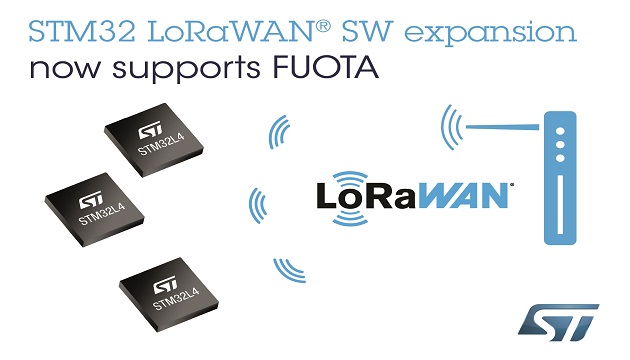STMicroelectronics has enhanced its STM32 LoRaWAN software expansion package for developers (I-CUBE-LRWAN ) to support the latest Firmware Update Over The Air (FUOTA) specifications.
FUOTA cost-effectively future-proofs LoRa devices by simplifying applying application-layer updates and RF-stack updates to devices in the field, increasing the value of LoRa as a long-range, low-power technology for connecting IoT devices. The LoRa Alliance has published three FUOTA LoRaWAN application specifications (v1) that together support and standardize FUOTA: Application Layer Clock Synchronization, Remote Multicast Setup, and Fragmented Data Block Transport. They are respectively involved in time synchronization, sending messages to groups of end devices, and data-file splitting.
By supporting the full firmware update as described in the current set of LoRa Alliance specifications, I-CUBE-LRWAN now enables STM32 developers to create LoRa endpoint devices that support FUOTA for STM32L4 microcontrollers taking benefits from the Secure Boot and Secure Firmware Update solution (X-CUBE-SBSFU) with open source crypto library. Indeed, this allows the update of the STM32L4 built-in program with new firmware versions, adding new features and correcting potential issues. The update process is performed in a secure way to prevent unauthorized updates and access to confidential on-device data. The pack includes the LoRaWAN stack with hardware abstraction layers and sample application code for STM32L0, STM32L1, and STM32L4 microcontrollers to ease evaluation and kick-start development. A test application for LoRaWAN certification tests is also included.
ST’s I-CUBE-LRWAN software can be used with LPWAN development boards and sensor expansion boards of the STM32 Nucleo ecosystem, such as the LoRa nodes included in the P-NUCLEO-LRWAN2 and P-NUCLEO-LRWAN3 developer packs.
The latest I-CUBE-LRWAN expansion package with FUOTA support for STM32L4 can be downloaded immediately, free of charge, from www.st.com/i-cube-lrwan. It has been made interoperable with various Network Servers, including those from Actility and Senet.
“With millions of LoRaWAN sensors currently in deployment, it is essential to have a forward-thinking strategy for devices that might spend more than 10 years in the field. ThingPark FUOTA drastically extends the lifecycle of the sensors and Actility is happy to provide fully interoperable servers with ST solution that will help all ST’s customers keep their devices running with latest security and feature updates,” said Olivier Hersent, CEO, Actility.
“Senet’s success in delivering feature-rich platforms for global IoT connectivity is enhanced by partnerships with market-leading technology companies like STMicroelectronics,” said Dave Kjendal, Chief Technical Officer at Senet. “STMicroelectronics’ support for LoRaWAN FUOTA expands our ability to deliver efficient, secure and reliable updates to endpoint devices, providing our customers with the maximum return on investment for IoT applications deployed at mass scale.”
Other network servers interoperable with the LoRaWAN protocol will be considered for integration as well. STMicroelectronics is also actively working on improving the performance of this FUOTA technology for future deliveries.
STM32 is a registered and/or unregistered trademark of STMicroelectronics International NV or its affiliates in the EU and/or elsewhere. In particular, STM32 is registered in the US Patent and Trademark Office.
For more information, visit www.st.com

